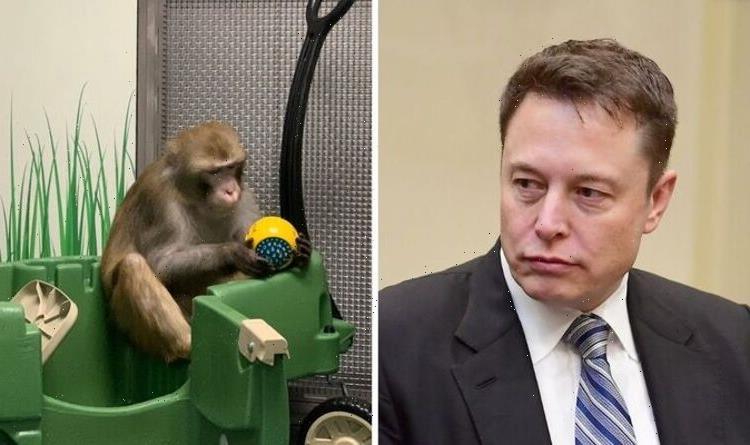Neuralink: Macaque plays videos games with its mind
We use your sign-up to provide content in ways you’ve consented to and to improve our understanding of you. This may include adverts from us and 3rd parties based on our understanding. You can unsubscribe at any time. More info
Mr Musk’s company — which is working to develop artificial intelligence (AI) that could one day allow humans to control technology with their minds — has denied allegations of animal abuse. In a statement published yesterday, Neuralink said that they were “absolutely committed to working with animals in the most humane and ethical way possible”. It comes after the Physicians Committee for Responsible Medicine (PCRM) alleged that “horrific abuse” took place, with monkeys having “had their brains mutilated in shoddy experiments and [been] left to suffer and die”.
The PCRM is a US-based non-profit organization that promotes plant-based diets and the elimination of animal testing in scientific research.
The complaint was filed with the US Department of Agriculture against Neuralink and its former partner, the California National Primate Research Center at the University of California Davis.
The Physician’s Committee has alleged that “invasive and deadly brain experiments” undertaken on 23 macaque monkeys were in violation of the US Animal Welfare Act.
Their complaint has also claimed that Neuralink and UC Davis staff did not provide dying monkeys with adequate veterinary care, failed to maintain the animals’ psychological well-being and used an unapproved substance dubbed “BioGlue” to kill the primates by destroying parts of their brains.
In a news release, the PCRM claimed that the “macaque monkeys used in the experiment were caged alone, had steel posts screwed to their skulls, suffered facial trauma, seizures following brain implants, and recurring infections at implant sites”.
They added: “In some cases, as a result of deteriorating health, Neuralink and UC Davis euthanized monkeys before they were even used in the planned experiment.”


In response, Neuralink has said that many of the monkeys involved in the trial were chosen for the so-called “terminal procedures” — in which the subjects are humanely euthanized while under anaesthesia — because they had pre-existing conditions that can lead to poor quality-of-life that were unrelated to the research.
In total, eight animals were killed, they said. Two were euthanized to acquire medical data, while the remainder were put to sleep following the advice of UC Davis veterinarians.
Four of these had developed infections following device implantation, one had a device failure and one experienced a surgical complication involving the use of BioGlue, a medical adhesive.
The firm has also said that BioGlue is, in fact, approved by the US Food and Drug Administration (FDA), contrary to the PCRM’s claims.
According to the PCRM, their complaint was based on documents they acquired following the filing of a public records lawsuit last year.
The non-profit has also this week moved to compel UC Davis to release photographs and videos of the monkeys.

According to the PCRM, UC Davis received more than $1.4million (around £1million) to conduct animal testing on Neuralink’s behalf.
PCRM research advocacy coordinator said: “UC Davis may have handed over its publicly-funded facilities to a billionaire, but that doesn’t mean it can evade transparency requirements and violate federal animal welfare laws.”
Neuralink’s partnership with UC Davis began in 2017 and continued for two-and-a-half years until the tech firm completed the construction of their in-house animal testing facilities.
Concerning the launch of this new “vivarium”, Neuralink said: “Our central mission is to design an animal care program prioritising the needs of the animals, rather than the typical strategy of building for human convenience alone.”
The facility, they added, is staffed with caretakers who are passionate about the welfare of the animals in their care.
DON’T MISS:
Elon Musk shares what life on Mars will be like ‘in our lifetime’ [INSIGHT]
Scientists find dirtiest dog which gathers the most mud [ANALYSIS]
Xampla leads race to replace single use plastic [REPORT]


Back in April 2021, the firm released a video that appeared to show a nine-year-old macaque monkey known as “Pager” playing a Pong-like video game with his mind.
The firm reported that, having been implanted with a Neuralink device, Pager’s brain activity was recorded as he learnt to play the game using a joystick for a banana smoothie reward.
Neuralink claimed that they were then able to disconnect the joystick and recalibrate the game so that the on-screen cursor moved in accordance with Pager’s brain activity as he moved his hands — rather than via the original physical controls.
The way in which this development was released, however, set off controversy, with critics saying that the experiment should have been published first in an academic journal where other scientists could assess the findings via the typical peer-review process.
According to Elon Musk, Neuralink’s goal with their first product will be to allow someone with paralysis to operate a smartphone with their thoughts “faster than someone using thumbs”.
Neuralink has said that they hope to move from animal to human trials of their brain-machine interface devices later this year.
Express.co.uk has reached out to both Neuralink and the California National Primate Research Center for comment.
Source: Read Full Article
